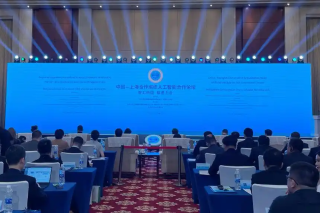Luban Workshop lauded for cultivating students' practical skills in Ethiopia
Inside the Luban Workshop in Addis Ababa, capital of Ethiopia, Yonas Akele, a 39-year-old Ethiopian educator, explains the operation of an assembly line to students with the help of an automation control platform from China.
Akele, currently a faculty member at the FDRE (Federal Democratic Republic of Ethiopia) Technical and Vocational Training Institute, is engaged in the Luban Workshop's training program. This initiative integrates theoretical knowledge with practical applications, providing students with a unique opportunity to translate classroom teachings into tangible skills.
The Luban Workshop in Ethiopia, a collaborative effort between the FDRE Technical and Vocational Training Institute and China's Tianjin University of Technology and Education, was inaugurated in 2021.
Offering specialized courses in industrial robotics technology, mechatronics technology, industrial control technology, and industrial sensor technology, the workshop aims to foster the cultivation of modern industrial technology talents much needed in Ethiopia's evolving industrial landscape.
Over the past five years, more than a dozen workshops in the name of Lu Ban, a craftsman in ancient China, have emerged across the African continent. Providing high-level vocational education for young Africans, these workshops symbolize an integral facet of Sino-African cooperation in talent development.
"Young people in Ethiopia are fortunate to study here, and I anticipate more Luban workshops will be established in Ethiopia in the future," Akele said.
Akele's journey as an advocate for the Luban Workshop began in 2018 when he pursued his master's degree at Tianjin University of Technology and Education. It was over there that he encountered the EPIP teaching model developed by the Luban Workshop. EPIP stands for engineering, practice, innovation and projects, which integrates theoretical learning with hands-on engineering applications.
"The most difficult part of my study was the practical part at the beginning, but under the guidance of my fellow Chinese classmates, I gradually improved through a lot of efforts," said Akele.
Upon his return to Ethiopia, Akele volunteered to join the teaching team at the Luban Workshop. Keen to advancing this innovative approach, he believes it will significantly enhance the effectiveness of teaching and learning.
"Four teachers are working at the Luban Workshop to guide students through practical training courses. I'm the only Chinese teacher," said Jiang Jiang, head of the workshop, adding that the long-term goal is to train enough Ethiopian talents that will eventually be able to teach Ethiopian students.
In collaboration with partners such as the African Union headquarters, the Ethiopian Luban Workshop extends its impact beyond Ethiopia's borders.
Through the East Africa Skills for Transformation and Regional Integration Project (EASTRIP), a joint initiative by the World Bank and African governments to improve the quality of technical and vocational education and training (TVET) programs, the workshop has organized five training sessions so far, benefiting nearly 200 TVET talents from Ethiopia, Kenya, Tanzania, and other nations.
"The workshop is not only dedicated to boosting our local strength and industrial capacity but also serves as a center of capacity building for the wider East African region," said Haftom Gebregziabher, deputy director-general of the FDRE Technical and Vocational Training Institute.

Copyright ©
Tianjin Municipal Government. All rights reserved. Presented by China Daily.
京ICP备13028878号-35



